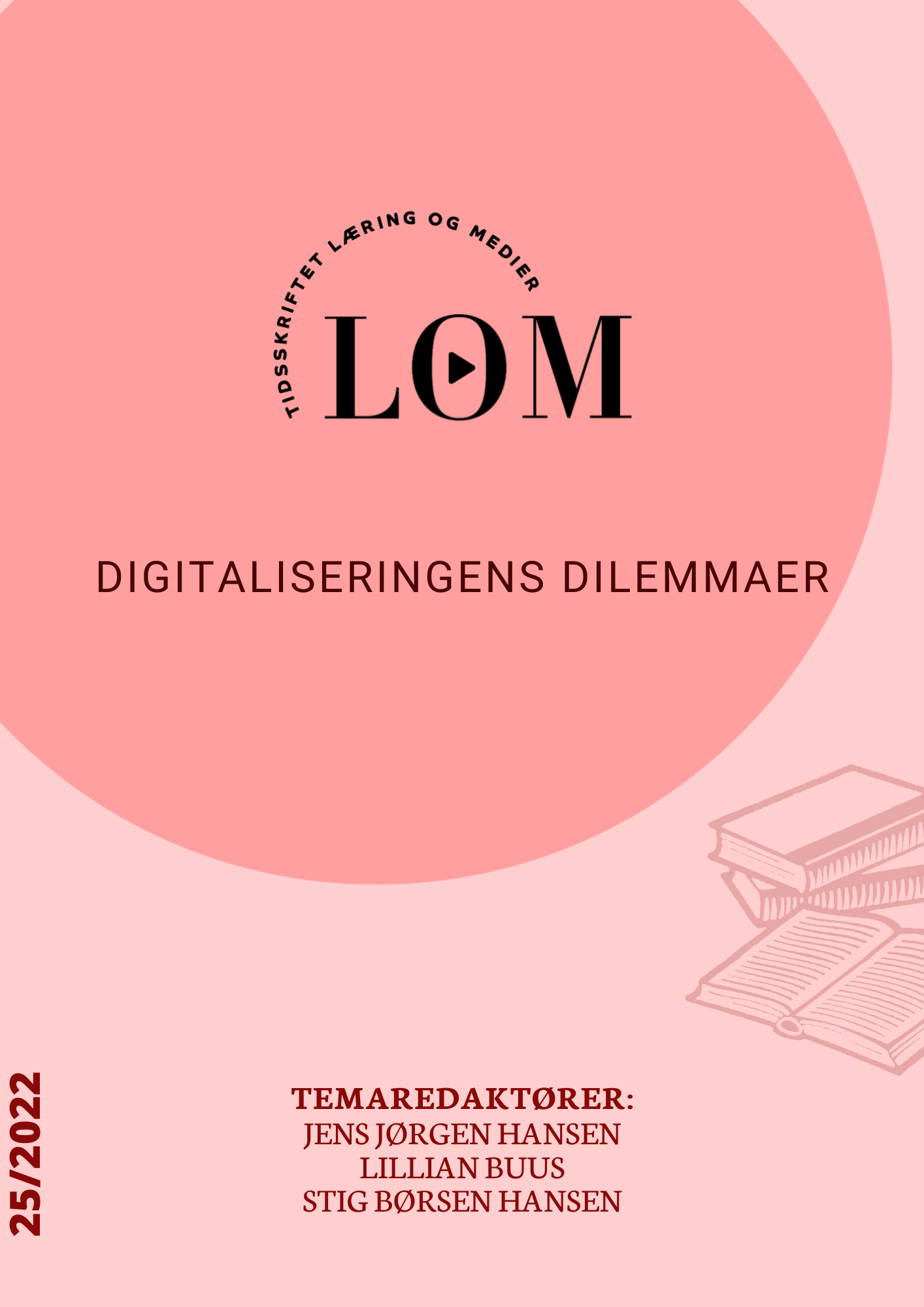The only thing I’m getting is the chat
Deltagelsesformer og dilemmaer i akademiske online-konferencer
DOI:
https://doi.org/10.7146/lom.v15i25.128834Nøgleord:
akademiske konferencer, chatkommunikation, forskningskommunikation, online deltagelsesformer, dilemmabegrebet, dokumentanalyse, onlinekonferencer, konferenceformaterResumé
Formålet med artiklen er at undersøge hvilke dilemmaer der er ved deltagelsen i akademiske onlinekonferencer og særligt hvilken rolle chatfora spiller. Artiklen redegør for tre generationer af akademiske konferenceformatet, det traditionelle fysiske format, det hybride twitterformat og nu onlinekonferencens chatformatet. Chatformatet skaber på den ene side nye muligheder for augmenteret deltagelse under konferencepræsentationer, og på den anden side en risiko for at afkobles konferencens faglige præsentation. Artiklen bygger på en dokument- og kommunikationsanalyse af chatforummet i forbindelse med Networked Learning Conference 2020 og keynote Rikke Toft Nørgårds præsentation. Gennem præsentationen blev der kommunikeret 151 chat beskeder distribueret mellem 34 deltagere. Chatforumet som kommunikationsmiljø og distribution af chatposts undersøges i artiklen på grundlag af teori om forskningskommunikation (Luhmann 2000) og kommunikationsmodi (Sandvik 2018)- Undersøgelsen har hensigt at synliggøre deltagernes forskellige deltagelsesformer: deltagelsesformer: komposition, samarbejde, deltagelse, indholdskuratering og medskabelse. Artiklen afsluttes med formulering af nogle guidelines til, hvordan man kan håndtere de dilemmafyldte deltagesesformer ved onlinekonferencer.
Downloads
Referencer
Bereiter, C. & Scardamalia, M. (2005). Technology and Literacies: From Print Literacy to Dialogic Literacy. I Nina Bascia, Alister Cumming, Amanda Datnow, Kenneth Leithwood, & David Livingstone (Red.), International Handbook of Educational Policy (Bd. 13, s. 749–761). Springer Netherlands. https://doi.org/10.1007/1-4020-3201-3_39
Caviglia, F., & Dalsgaard, C. (2020). Introduktion til digitale kompetenceområder. Center for Undervisningsudvikling og Digitale Medier, Aarhus Universitet.
Coffey A (2013) Analysing documents. In: Flick U (ed.) The Sage Handbook of Qualitative Data
Analysis. London: Sage, pp. 367–379.
Den Danske Ordbog. Lokaliseret på https://ordnet.dk/ddo
Dewey, J. (1916/2005). Democracy and Education. An introduction to the philosophy of education. New York: Cosimo Classics.
Ebner, M., & Reinhardt, W. (2009). Social networking in scientific conferences–Twitter as tool for strengthen a scientific community. In Proceedings of the 1st International Workshop on Science (Vol. 2, pp. 1-8).
Ebner, M. (2009). Introducing live microblogging: how single presentations can be enhanced by the mass. Journal of research in innovative teaching, 2(1), 91-100.
Forfatter 1
Forfatter 2
Guri-Rosenblit, S. (2006). Eight paradoxes in the implementation process of e-learning in higher education. Distances et savoirs, 4(2), 155-179.
Introne, J., & Goggins, S. (2012). Tracing knowledge evolution in online forums. In Proceedings from ACM Web Science Conference: Words and Networks Workshop.
Jakobson, R. (1981) "Linguistics and Poetics." Poetry of Grammar and Grammar of Poetry. Vol. 3 of Selected Writings. 7 Vols. The Hague: Mouton. 18-51.
Kant, Immanuel 1803: Über Pädagogik. In: Ders.: Werke in 10 Bänden. Hrsg. Von
Wilhelm Weischedel, Band I 0, Darmstadt: Wissenschaftliche Buchgesellschaft 1983,
S. 691-764
Lambert, F. (2017). Virtual Trace: A Framework for Applying Physical Trace Research Methodology in a Virtual Electronic Context. Qualitative and Quantitative Methods in Libraries, 3(4), 1001-1018.
Luhmann, N. & K.-E. Schorr (1982). Das Technologiedefizit der Erziehung und die Pädagogik. Zwischen Technologie und Selbstreferenz. Fragen an die Pädagogik, Suhrkamp, Frankfurt am Main pp. 11-40
Luhmann, N. (1990): Die Wissenschaft der Gesellschaft. Suhrkamp. Frankfurt am Main.
Luhmann, N. (2000). Sociale systemer – grundrids til en almen teori. København: Hans
Reitzel
Luckin, R. (2010). Re-Designing Learning Contexts: Technology-Rich, Learner-Centred Ecologies. London and New York: Routledge.
Malinen, S. (2015). “Understanding user participation in online communities: a systematic literature review of empirical studies”, Computers in Human Behavior, 46, 228–238.
Ross, C., Terras, M., Warwick, C., & Welsh, A. (2011). Enabled backchannel: Conference Twitter use by digital humanists. Journal of Documentation.
Sandvik, K. (2018). Tværmedial kommunikation: producent-, bruger-og hverdagsperspektiver. Samfundslitteratur.
Reinhardt, W., Ebner, M., Beham, G., & Costa, C. (2009). How people are using Twitter during conferences. Creativity and Innovation Competencies on the Web. Proceedings of the 5th EduMedia, 145-156.
Radovanovic, D., and Ragnedda, M. Small talk in the digital age: Making sense of phatic posts. In Proc. 2nd #MSM Workshop, (2012), 10–13.
Reinhard, D., Mark C. Stafford & Troy C. Payne (2021) COVID-19 and Academia: Considering the Future of Academic Conferencing, Journal of Criminal Justice Education, 32:2, 171-185, DOI: 10.1080/10511253.2020.1871047
Rekimoto, J., Ayatsuka, Y., Uoi, H., & Arai, T. (1998, April). Adding another communication channel to reality: an experience with a chat-augmented conference. In CHI 98 conference summary on Human factors in computing systems (pp. 271-272).
Sallnäs, E. L. (2005). Effects of communication mode on social presence, virtual presence, and performance in collaborative virtual environments. Presence: Teleoperators & Virtual Environments, 14(4), 434-449.
von Oettingen, A. (2001). Det pædagogiske paradoks – et grundstudie i almen pædagogik. København: Klim.
Downloads
Publiceret
Citation/Eksport
Nummer
Sektion
Licens
Copyright (c) 2022 Jens Jørgen Hansen

Dette værk er under følgende licens Creative Commons Navngivelse – Ikke-kommerciel – Ingen Bearbejdede Værker (by-nc-nd).

Artikler publiceret i Tidsskriftet for Læring og Medier er licenseret under en Creative Commons Navngivelse-IkkeKommerciel-IngenBearbejdelse 4.0 Unported Licens.
Forfattere bevarer deres ophavsret og giver tidsskriftet ret til første publicering, samtidigt med at værket er omfattet af Creative Commons Attribution-licensen: Navngivelse – Ikke-kommerciel - Ingen Bearbejdede Værker (by-nc-nd). Læs om licensen på http://www.creativecommons.dk/om/.
---
På LOM.dk kan du endvidere finde artikler fra det nu nedlagte Tidsskrift for Universiteternes Efter- og Videreuddannelse (UNEV). Vær opmærksom på, at der gælder særlige regler for UNEV artikler:
Det er forfatterne og evt. andre ophavsret indehavere, der har ophavsretten til artikler udgivet i UNEV regi, og det er en betingelse for adgang til artiklerne, at brugere anerkender og overholder de juridiske retningslinjer forbundet hermed.
- Brugere må downloade og printe én kopi af en hvilken som helst UNEV artikel mhp. private studier eller forskning.
- Det er ikke tilladt at videredistribuere artikler eller anvende disse til indtægtsdækkede aktiviteter eller kommercielle formål.
- Det er tilladt at distribuere URL’en til UNEV artikler.


